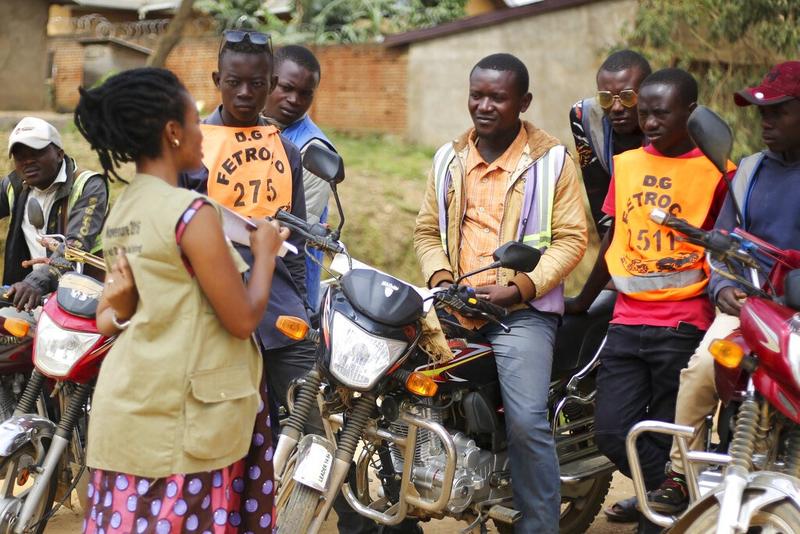 In this photo taken on April 10, 2020, a Congolese community mobilizer who works with the aid group World Vision in Beni, eastern Congo, engages the public about coronavirus prevention. (AL-HADJI KUDRA MALIRO / AP)
In this photo taken on April 10, 2020, a Congolese community mobilizer who works with the aid group World Vision in Beni, eastern Congo, engages the public about coronavirus prevention. (AL-HADJI KUDRA MALIRO / AP)
DUBAI/RIYADH/WASHINGTON - Finance officials from the Group of 20 major economies agreed on Wednesday to suspend debt service payments for the world's poorest countries through the end of the year, a move quickly matched by a group of hundreds of private creditors.
The actions to freeze both principal repayments and interest payments will free up more than US$20 billion for the countries to spend on improving their health systems and fighting the coronavirus pandemic, Saudi Finance Minister Mohammed al-Jadaan told reporters after a virtual meeting of G20 finance officials.
Saudi Arabia is hosting the G20 meetings this year.
The actions to freeze both principal repayments and interest payments will free up more than US$20 billion for the countries to spend on improving their health systems and fighting the coronavirus pandemic, Saudi Finance Minister Mohammed al-Jadaan said
Wednesday's video conference meeting of finance ministers and central bank governors ran well over the scheduled two hours, delaying news conferences planned by al-Jadaan and International Monetary Fund (IMF) Managing Director Kristalina Georgieva.
The meeting came amid widespread criticism - including from many G20 member countries - of US President Donald Trump's decision on Tuesday to temporarily halt funding to the World Health Organization over its handling of the COVID-19 pandemic, which has now killed more than 136,000 people.
ALSO READ: US decision to halt funding to WHO draws sharp criticism
The debt standstill offer is open to the world's poorest and least-developed countries, as defined by the World Bank and the United Nations, as long as they are current in their debt service payments to the World Bank and the IMF.
The initiative, backed by the Paris Club of creditors, is part of globally coordinated efforts to bolster the global economy which is facing the deepest recession since the Great Depression of the 1930s due to the pandemic.
"We strongly welcome the decision of the G20 to respond to our call to allow the poorest countries of the world that request forbearance to suspend repayment of official bilateral credit on May 1st," World Bank Group President David Malpass and IMF's Georgieva said in a joint statement.
"This is a powerful, fast-acting initiative that will do much to safeguard the lives and livelihoods of millions of the most vulnerable people."
In a new IMF document, Georgieva said debt relief was in the interest of all, "as the global community is as strong as its weakest member in a global pandemic."
German Finance Minister Olaf Scholz called the move "an act of international solidarity with a historical dimension," adding it would let the countries invest in healthcare "immediately and without time-consuming case-by-case examination".
Oxfam International said more work was needed to protect Lebanon, Ecuador and other countries not covered by the deal, and to raise the estimated US$1 trillion needed to help countries weather the "economic tsunami" unleashed by the pandemic.
A source familiar with the agreement said it would cover US$12 billion to US$14 billion in bilateral debt service payments owed by the 76 International Development Association (IDA) countries, plus Angola, through the end of the year.
READ MORE: COVID-19: G20 leaders to inject US$5t into global economy
Private creditors will join the debt relief effort on a voluntary basis, said the International Institute of Finance, which represents 450 banks, hedge funds and other global financial firms.
That is critical since countries had been reluctant to offer debt relief if countries could use the freed funds to service private-sector debts.
Malpass said the World Bank, the IMF and other multilateral lenders were exploring options for suspending their debt service payments while maintaining high crediting ratings on their bonds.
The IMF is looking to triple its concessional financing for the poorest countries to over US$18 billion to help them respond to the pandemic, the IMF chief said
Georgieva said she was hopeful that the G20 deal would set the stage for more consensus to expand IMF resources to deal with fallout from the pandemic.
The debt suspension will last until the end of the year but creditors will consider a possible extension during 2020, taking into account a report on countries' liquidity needs by the World Bank and the IMF, the G20 said.
IMF wants to triple concessional financing
The IMF is looking to triple its concessional financing for the poorest countries to over US$18 billion to help them respond to the pandemic, Georgieva said.
Concessional loans generally offer terms that are favorable to those available on the market.
Late on Wednesday, she said the Fund's Executive Board had approved creation of a short-term liquidity line, a revolving and renewable backstop for member countries with very strong policies and fundamentals.
The new instrument, first proposed but not finalized in 2015, allows certain countries revolving access of up to 145 percent of their quota to cover short-term balance-of-payments needs, which could prove helpful in the current crisis.
Georgieva said there was also an "emerging consensus" to deploy existing Special Drawing Rights (SDR) to allow more lending to developing countries.
But her sentiment on the SDRs - the IMF's unit of exchange - was at odds with a statement from G20 finance leaders that said the group had reached no consensus over the use of SDRs, either through a new allocation or through lending "excess" SDRs to poor countries.


